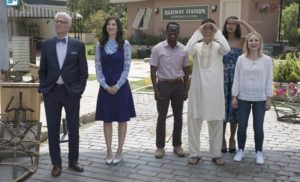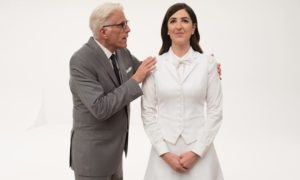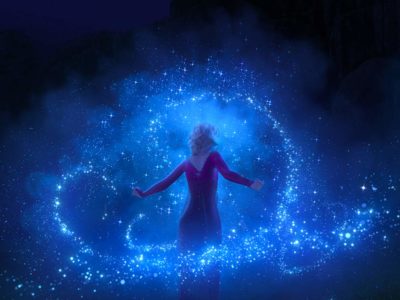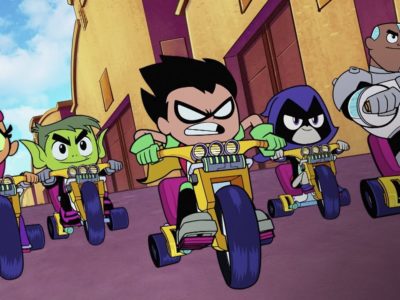The Good Place: Season 2
 After pulling off a twist ending that completely redefined the premise of the show in the final minutes of its first season, The Good Place had a lot to live up to in season two. Not only did it seek to avoid the sophomore slump that all shows must deal with, it also needed to find a way to continue to challenge and surprise its audience – something that has become increasingly difficult in this current age of Reddit sleuths and YouTube video essayists. The writing staff faced a unique challenge: write a season of television that places instantly-beloved characters into a completely new context, moving the story along in a way that is both unexpected and natural, and also making sure the show is actually funny. Simply put, there were multiple opportunities for this season to go horribly wrong.
After pulling off a twist ending that completely redefined the premise of the show in the final minutes of its first season, The Good Place had a lot to live up to in season two. Not only did it seek to avoid the sophomore slump that all shows must deal with, it also needed to find a way to continue to challenge and surprise its audience – something that has become increasingly difficult in this current age of Reddit sleuths and YouTube video essayists. The writing staff faced a unique challenge: write a season of television that places instantly-beloved characters into a completely new context, moving the story along in a way that is both unexpected and natural, and also making sure the show is actually funny. Simply put, there were multiple opportunities for this season to go horribly wrong.
The writers’ tightrope walk is mirrored in Michael’s frantic attempts at orchestrating each event and circumstance in order to most effectively torture his four human subjects. Now that the audience is aware of Michael’s true demonic identity, his scheming becomes a focal point of the series. We still root for Eleanor and company to work together and become better people, but now we do so in opposition to a group of comically incompetent demons. All throughout the first few episodes of the season, Michael and his cronies scramble to give Eleanor, Chidi, Jason, and Tahani their own personal hell. Yet somehow, time and time again, the humans rise to the challenge, uncovering the ruse of “The Good Place” and throwing a wrench into the master plan, forcing Michael to reboot their entire afterlife experience hundreds upon hundreds of times. As hilarious as it is to watch this all unfold, there is also something remarkably beautiful about a group of broken people joining together to overcome evil. The Good Place posits that love is the greatest good in the universe – all people are capable of it, and when properly harnessed, it has the power to defeat the forces of evil.
 It is important to note that this is not a Christian show, so Christian viewers should not expect it to suggest that human love and good deeds are ultimately empty apart from Christ. In fact, it really doesn’t set out to be a religious or spiritual show in any sense. Even though the story takes place in the afterlife, The Good Place is entirely concerned with human behavior in the here-and-now. It is interested in the value we place on each other as human beings – the way we treat each other, regardless of the rewards/consequences. And while, from a biblical perspective, we must uphold the centrality of the Gospel and view all of life in light of eternity, we can affirm that, in the here-and-now, Christlike sacrificial love and service can be transformational to individuals and their communities. This is seen in Eleanor’s shift from being a selfish nightmare of a person to someone who wholeheartedly seeks the good of others. It is seen in the moral and emotional awakening of Janet, the omniscient not-a-girl, not-a-robot creature who turns from mindlessly obeying orders to genuinely caring for people. And it is especially seen in the transformation of Michael, a literal demon who grew to love the very humans he set out to torture.
It is important to note that this is not a Christian show, so Christian viewers should not expect it to suggest that human love and good deeds are ultimately empty apart from Christ. In fact, it really doesn’t set out to be a religious or spiritual show in any sense. Even though the story takes place in the afterlife, The Good Place is entirely concerned with human behavior in the here-and-now. It is interested in the value we place on each other as human beings – the way we treat each other, regardless of the rewards/consequences. And while, from a biblical perspective, we must uphold the centrality of the Gospel and view all of life in light of eternity, we can affirm that, in the here-and-now, Christlike sacrificial love and service can be transformational to individuals and their communities. This is seen in Eleanor’s shift from being a selfish nightmare of a person to someone who wholeheartedly seeks the good of others. It is seen in the moral and emotional awakening of Janet, the omniscient not-a-girl, not-a-robot creature who turns from mindlessly obeying orders to genuinely caring for people. And it is especially seen in the transformation of Michael, a literal demon who grew to love the very humans he set out to torture.
Sure, Michael’s change of heart — or whatever the demon equivalent of a heart is – first came about as an attempt at self-preservation, as he was in danger of being “retired” (utterly destroyed) due to his carelessness. But over time, as he witnessed the profound impact that real love can have on people, he resolved to first learn about what love is, and then to live it out, pursuing reconciliation in relationships that seemed irreparably damaged. After sitting in on Chidi’s ethics classes and teaming up with the humans in order to help get them to the real Good Place, Michael’s entire mission completely changes. Whereas he once derived great pleasure from the humiliation of others, he now walks in justice and mercy, motivated by a deep desire to see his friends happy. But just as our old worldly companions seek to hold us back from pursuing righteousness, thus leading us back into death, Michael’s fellow demons sought to stop him from helping the humans by any means necessary.
 At a key point in their journey toward The Good Place, with the demons hot on their trail, Michael makes the radical decision to stay behind and sacrifice himself in order for the humans to be saved. This is a beautiful reflection of Jesus’ words in John 15:13: “Greater love has no one than this: to lay down one’s life for one’s friends.” The fact that it comes from a character who, prior to that point, had dedicated his existence to torturing people, is a powerful reminder that no one is beyond redemption, and everyone is capable of being transformed from the inside out. Sacrificial love, modeled in community, has the power to turn a selfish, greedy person into someone who loves others sacrificially. In the Gospel, the sacrificial love of Christ saves us from our sins and gives us eternal life. As a result, we are changed by the grace of God, and in response to his goodness, we share his love with other people. This is the power of the love of God, and it is his will that we would love one another just as he has loved us.
At a key point in their journey toward The Good Place, with the demons hot on their trail, Michael makes the radical decision to stay behind and sacrifice himself in order for the humans to be saved. This is a beautiful reflection of Jesus’ words in John 15:13: “Greater love has no one than this: to lay down one’s life for one’s friends.” The fact that it comes from a character who, prior to that point, had dedicated his existence to torturing people, is a powerful reminder that no one is beyond redemption, and everyone is capable of being transformed from the inside out. Sacrificial love, modeled in community, has the power to turn a selfish, greedy person into someone who loves others sacrificially. In the Gospel, the sacrificial love of Christ saves us from our sins and gives us eternal life. As a result, we are changed by the grace of God, and in response to his goodness, we share his love with other people. This is the power of the love of God, and it is his will that we would love one another just as he has loved us.
 As the season concludes, one might expect a perfect, happy ending for all of the characters. They have made incredible progress, and this is a sitcom, after all. Instead, it is revealed that they still have a long way to go in order to get into The Good Place, and they do not have any more time to improve. This serves as a sobering reminder that behavior modification is not the answer; we need new hearts. But in his newfound love for and confidence in the humans, Michael makes one final plea with the judge: let the humans go back to earth and rightfully earn their spots in The Good Place once and for all. The judge agrees, ending the season on a daunting, yet hopeful note. Eleanor, Chidi, Jason, and Tahani are still broken and sinful in this second chance at life, but in some mysterious way that they are incapable of understanding, they are not the same as they once were. They have been changed by the power of sacrificial love.
As the season concludes, one might expect a perfect, happy ending for all of the characters. They have made incredible progress, and this is a sitcom, after all. Instead, it is revealed that they still have a long way to go in order to get into The Good Place, and they do not have any more time to improve. This serves as a sobering reminder that behavior modification is not the answer; we need new hearts. But in his newfound love for and confidence in the humans, Michael makes one final plea with the judge: let the humans go back to earth and rightfully earn their spots in The Good Place once and for all. The judge agrees, ending the season on a daunting, yet hopeful note. Eleanor, Chidi, Jason, and Tahani are still broken and sinful in this second chance at life, but in some mysterious way that they are incapable of understanding, they are not the same as they once were. They have been changed by the power of sacrificial love.







